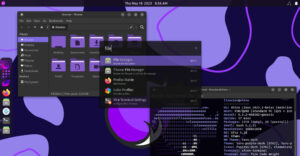
Why is Google promoting two open source operating systems that can both be run on netbooks — Android and Chrome?
Is this part of a larger strategy, where Google will direct the two along different paths — Chrome for netbooks and Android for the smartphone?
Or could the Internet search giant just be floundering, with different groups of techies each going their own merry way with no clear marketing position?
Free to Choose?
Google announced the Chrome OS in July.
This was many months after the release of the first smartphone to carry the Android operating system. While Android has already won the favor of several smartphone manufacturers, the OS can also run on netbooks after a little tweaking, which means developers, netbook vendors and users could be forced to choose between the two OSes.
Google’s motivation has puzzled analysts. “I’m not sure that even the respective Chrome and Android teams at Google know the answer,” Laura DiDio, principal at ITIC, told LinuxInsider. “One would have expected Google to base Chrome on Android, but it didn’t.”
Unless Google clarifies its strategy, having two OSes could backfire, DiDio warned. “Instead of Chrome challenging and eroding Microsoft’s market share when it ships sometime in 2010, it could cannibalize Android,” she said.
Chrome, in fact, is already nibbling away at Android’s market. “The Chrome OS did substantial damage to the Android momentum when news of it was released prematurely,” said Rob Enderle, principal analyst at the Enderle Group. “One OS positioned against Microsoft is hard enough, and trying for two competing platforms at the same time is near-suicidal,” he told LinuxInsider
Android-Powered Computers
At least two Android-powered, non-smartphone devices are already on the market.
Chinese manufacturer Skytone offers the Alpha 680, which has a seven-inch screen and runs on an ARM11 32-bit 533 MHz processor. The device has a seven-inch LCD screen with 800 by 480 pixel resolution, and it comes equipped with two USB 2.0 slots; an SD/MMC card slot with support for SDHC; and 10/100 MB Ethernet.
Prototypes of the Skytone Alpha 680 were demonstrated at an electronics trade show in April.
Another device purportedly comes from i-Buddie, according to the gadget blog Engadget. It runs on an Intel Atom N270 processor. A video demonstration of the i-Buddie is available on YouTube.
Meanwhile, Acer has announced support for Android on its Aspire line of netbooks, due in the third quarter.
The Beat of Different Drummers
Google has perhaps been less than reassuring to vendors who have committed to Android as an OS.
In announcing Chrome OS, senior Google executives Sundar Pichai and Linus Upson said it is a new project, separate from Android, which was designed from the beginning to work across a variety of devices, from phones to set-top boxes to netbooks.
The Chrome OS is for people who spend most of their time on the Web. Chrome is being designed to power computers ranging from small netbooks to full-size desktop systems.
“Anyone can take the Android platform and add code or download it to create a mobile device without restrictions,” Google spokesperson Eitan Bencuya told LinuxInsider. “The Android smartphone platform was designed from the beginning to scale downward to feature phones and upward to MID and netbook-style devices. We look forward to seeing what contributions are made and how an open platform spurs innovation.”
In plain English, it seems Google is throwing both OSes out there and seeing what people do with them.
Battling for the Smartbook Market
The first battlefield for Android and Chrome is the smartbook market, where they overlap, Enderle said.
Smartbooks are mobile devices that fall between smartphones and netbooks, offering always on, all-day battery life; 3G connectivity and other smartphone features together with a full QWERTY keyboard. “That should be the ceiling for Android and the floor for the Chrome OS, which will grow to larger devices,” Enderle said.
Early smartbooks are expected to be powered by Qualcomm’s high-performance Snapdragon processors, but other chip makers are developing low-powered ARM-based chips for this market.
At the Computex Taipei show, Qualcomm said more than 15 manufacturers, including Asus, HTC and Toshiba, are developing products based on Snapdragon. The processor does not run Windows OSes, so Snapdragon-based smartbooks have to run Linux.
Netbooks Are Hot, MacBooks Are Not
Meanwhile, the netbooks market is heating up as the recession bites into consumers’ wallets. ITIC projects that netbook unit shipments will double over the next year, although they have a small base at present.
More expensive laptops, however, may suffer. A survey by online consumer electronics recommendation site Retrevo found that most students won’t consider buying a Mac because they can’t afford one. Thirty-four percent of the more than 300 people surveyed said they’d buy netbooks, while 49 percent said they would buy full-sized PCs.
The release of Windows 7 on Oct. 22 will further hit Mac sales, Retrevo president and CEO Vipin Jain told LinuxInsider. “We think Windows 7 is likely to change the playing field for Apple in the laptop category.”
That will also open up the market for Google, if it can keep its eye on the ball.
Which Way Is Up?
The problem is, it’s not clear that Google even knows what the ball is or where it is.
“Google doesn’t seem to know which OS it wants netbook makers to pick, and this is causing all kinds of problems,” Enderle of the Enderle Group said. “This is already causing problems with vendors and shifting out ship dates.”
Google needs to come clean and provide the industry — especially crucial software developers and hardware OEMs — with specifics regarding its strategy for both Chrome and Google; the differences in each platform; and where each will be used, ITIC’s DiDio said.
“Otherwise, in the ensuing confusion, third-party ISVs (independent software vendors) and hardware OEMs could eschew both Chrome and Android in favor of other manufacturers,” she warned. “If Google scales back plans to use Android as its primary OS for netbooks, what happens to companies like Acer, which has already announced support for Android on its Aspire One line of netbooks, due in the third quarter?”
Google’s timing for the announcement of Chrome OS was a bid to steal the thunder from Windows 7, according to DiDio.
“Chrome can’t challenge Microsoft in the near or intermediate term since it won’t be commercially available until next year,” she pointed out. “This is a classic big-vendor maneuver by Google to camouflage its shortcomings.”




















































If you look carefully, you’ll notice that Microsoft is also promoting two operating systems – WinCE and 7. In fact, until October, they will be stuck selling THREE – WinCE, XP and Vista.
The difference is that Microsoft’s products are not scalable, technologically or legally. WinCE runs ONLY on ARM, XP could ONLY be licensed for low-end x86 devices, and Vista needs… well, let’s be charitable and say "high-end resources".
Because Android and Chrome are FOSS and use the Linux kernel, they can scale to whatever devices the CUSTOMER wants to buy. Android is optimized for smartphones through netbooks, Chrome for netbooks to Vista-sized mega-hardware – but I can compile and sell them on any hardware I choose. The overlap occurs as a natural consequence of freedom, and it allows ME to decide what OS I want on my netbook rather than a mega-corporation.
So… Since I prefer choice, I like Google’s business model quite a bit better. (Disclaimer: I run Maemo on my MID and Ubuntu on my netbook and desktop, so I’m already pre-disposed to freedom. 😉
I don’t see this big a problem with the concept. I might agree with you on the fact that Google isn’t marketing the OSes the right way, but the idea is great and pretty simple :
– Two operating systems for 2 markets
Phones are coming closer to "handheld computers" and Netbooks are between desktops and Handhelds. One can see Android for the Handheld market and Chrome OS for the Desktop market. As the netbook is in the middle, it will depend on the manufacurer or the model, which of the two operating systems would be most adapted. The manufacturers will have to ask themselves : "Is this device a handheld or a desktop replacement?"